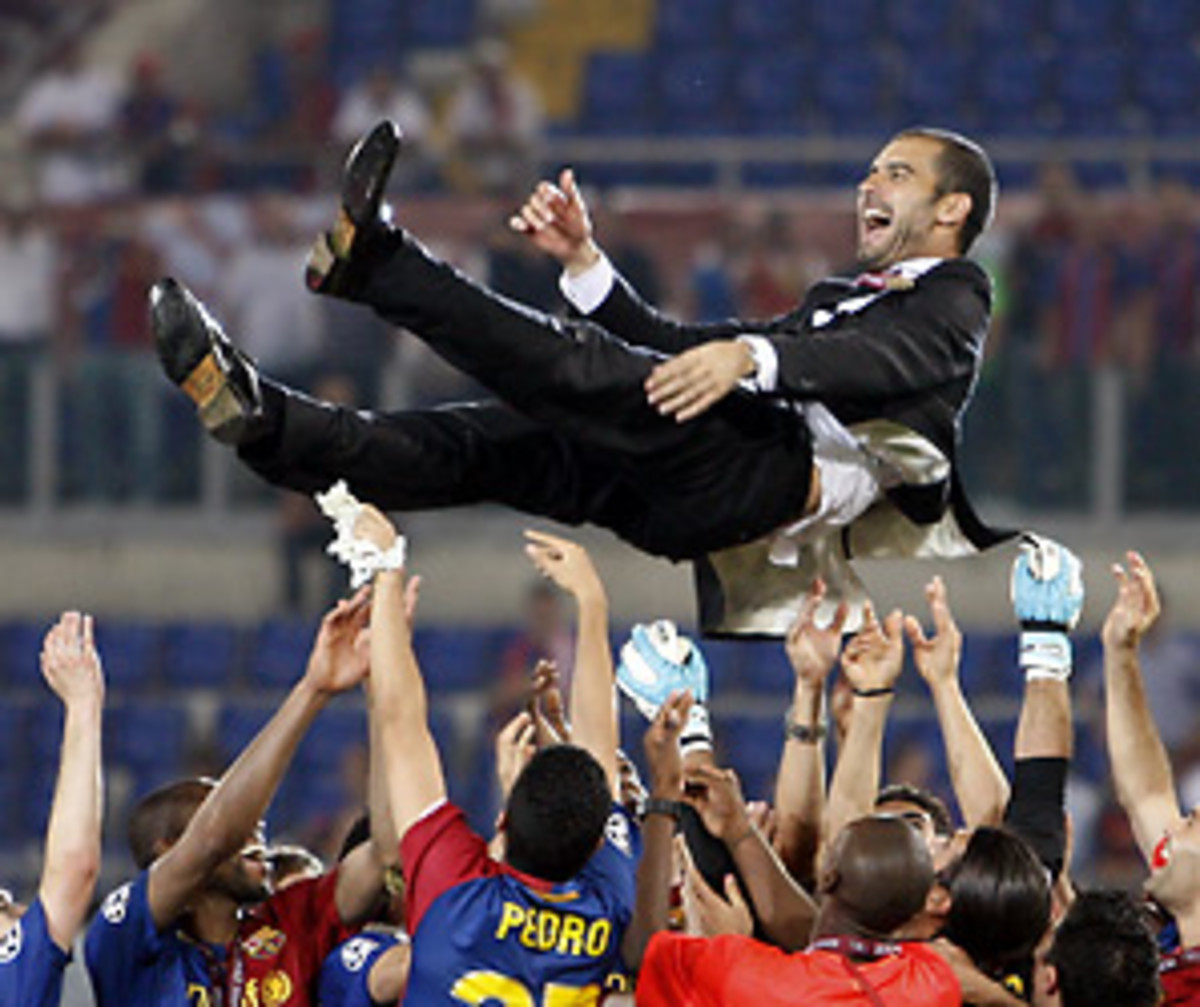
Guardiola out-coaches the master
And this time, it was the lions who emerged bruised and battered (RECAP). Pep Guardiola's boys now fully deserve the moniker Dream Team 2.0: They are the updated heirs to Johan Cruyff's utopian footballing vision of the early 1990s (a utopia of which, lest we forget, Guardiola himself was an integral part).
Logic and form pointed to victory for Manchester United. After all, Barça was missing three-quarters of its starting back four, and its best midfielder (Andrés Iniesta) and most experienced striker (Thierry Henry) were coming off injury layoffs (not that you would have noticed in Iniesta's case). And, of course, this Barça side squeaked into the final by the narrowest of margins (while benefiting from some controversial officiating at the expense of Chelsea).
United, on the other hand, looked like a team that always had an extra gear. It was a chameleon side that could beat you in so many ways: It could out-pass you, overrun you, out-muscle you, out-think you and, if needed, shut up shop, defend en masse and outlast you. But all that was before kickoff. Once inside the green rectangle, it's 11 men in shirts, shorts and cleats taking on 11 other men. And if the underdogs have the guile and intelligence to do so, they can rewrite the script.
Manchester United stormed out of the box with a furious 10-minute spell which could have seen it score two goals. Cristiano Ronaldo, evidently driven by the prospect of outshining Lionel Messi, looked uncontainable. United pushed right up and compressed Barça into its own half. If that was the game plan, it was certainly working.
Yet by the 15th minute, Barça had found its rhythm, and the twin creative geniuses of Xavi and Iniesta went to work. United found itself ceding possession and retreating deeper and deeper, exactly what it wasn't supposed to do (and what it hadn't done in the opening few minutes).
Here, you have to give credit to Guardiola for winning the tactical battle hands down. Sir Alex Ferguson deployed Ryan Giggs as a de facto center forward, a position he never really has played during his 18-year career and a role for which, at age 35, he seems particularly unsuited. The idea may have been to pin Barça back and force one of the midfielders to retreat. Instead, Barça just ignored him (and with Yaya Touré and Gerard Piqué in such outstanding form, it could afford to do so). The result was that Michael Carrick and Anderson found themselves undermanned in the middle of the park.
Stopping Xavi and Iniesta with a full complement of midfielders is difficult enough -- doing so with just two guys (one of whom, Anderson, seemed to sleepwalk through the first half) was always going to be a recipe for disaster.
Out wide, Sir Alex was counting on Patrice Evra and Wayne Rooney on the left and John O'Shea and Park Ji-Sung on the right to act as bulwarks against Messi and Henry. This would have been a potential masterstroke if Barça had attacked down the wings. But it didn't. Instead, Henry and, especially, Messi came inside regularly, often switching positions with Samuel Eto'o. This put further pressure on the already embattled Carrick while effectively taking United's fullbacks out of the game as an attacking force. Indeed, so preoccupied with Messi and Henry were O'Shea and Evra that they hardly crossed the halfway line, robbing United of one of its most potent offensive options in the case of Evra.
It didn't help, of course, that Nemanja Vidic had an off night, basically gifting Eto'o his goal in the first half. It was 1-0 at the break, but it probably should have been more, so comprehensively was United battered. Ferguson had a half-dozen options from which to choose. With the benefit of hindsight, he chose the wrong one, at the wrong time.
On came Carlos Tévez for Anderson. Ronaldo now had a foil to play alongside him, but the midfield was even less dynamic than before. The result was a side which simply could not win back possession, a team with five guys at the back and five guys up front, waiting for the ball. Dimitar Berbatov's entrance was a roll of the dice, but did little beyond augmenting the static nature of United's front men and the almost complete absence of a midfield. When Barça won the ball back, it was almost always an easy stroll to the edge of the United penalty area. When United had the ball, finding the front guys often mean risky diagonal passes -- if not quite "Hail Marys," then at least long post patterns.
It was one of the most lop-sided 2-0 victories you will ever see and, perhaps, the most one-sided final of the last 15 years (with the exception of FC Porto vs. AS Monaco in 2004). You don't have to be a Barcelona fan to celebrate the fact that, on the night, quality and tactics triumphed. It's too early to say whether this is the beginning of a new era at the Camp Nou. But it's undeniable that what Guardiola has achieved -- winning the treble in his first year of management -- is not just monumental, it's unprecedented.
As for United, it paid the price for some really bad decisions. Had Ferguson made different choices, Barça may still have won of course, but there is no doubt that on Wednesday, United's tactics didn't help.
Blame the manager? Not at all. He got United here, guided the team to three important trophies this season and he remains one of the all-time greats. It's just that on a night when two equally gifted teams took the pitch, the one who was far superior tactically emerged as the victor. This is one final which will go down in history.




